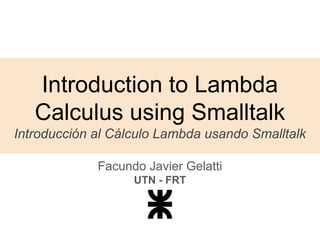
Introduction to Lambda Calculus using Smalltalk by Facundo Javier Gelatti
- 1. Introduction to Lambda Calculus using Smalltalk Introducción al Cálculo Lambda usando Smalltalk Facundo Javier Gelatti UTN - FRT
- 2. What is Lambda Calculus? ¿Qué es el Cálculo Lambda? How does Lambda Calculus work? ¿Cómo funciona el Cálculo Lambda? Understanding Lambda Calculus using Smalltalk Entendiendo el Cálculo Lambda usando Smalltalk
- 3. What is Lambda Calculus? ¿Qué es el Cálculo Lambda?
- 4. Alonzo Church - https://en.wikipedia.org/wiki/File:Alonzo_Church.jpg Alonzo Church 1930s
- 5. Effective computability Computabilidad efectiva (que algo sea computable) Turing Machines Máquinas de Turing Lambda Calculus Cálculo Lambda Computable Function Función Computable Program (or Algorithm) Programa o algoritmo
- 6. How does Lambda Calculus work? ¿Cómo funciona el Cálculo Lambda?
- 7. Lambda Calculus syntax La sintaxis del Cálculo Lambda ● Function definition scheme Esquema de definición de funciones ● Transformation rule Regla de transformación
- 8. Variable binding operator (function definition) Definición de una función Variable (function parameter) Parámetro de la función Lambda term (function body) Cuerpo de la función λ x.x Lambda Calculus syntax La sintaxis del Cálculo Lambda
- 9. Function to be applied Función a ser aplicada Function argument Argumento de la función (que puede ser otra función!) f x Lambda Calculus syntax La sintaxis del Cálculo Lambda
- 15. (λa.(λb.a)) x y (λb.x) y β-Reduction
- 16. (λa.(λb.a)) x y (λb.x) y β-Reduction
- 17. (λa.(λb.a)) x y (λb.x) y x β-Reduction
- 18. How it is possible that we can express anything that is computable using only Lambda Calculus? ¿Cómo es posible que podamos expresar cualquier cosa que sea computable utilizando solamente Cálculo Lambda?
- 19. Understanding Lambda Calculus using Smalltalk Entendiendo el Cálculo Lambda usando Smalltalk
- 20. (λx.x) y [:x | x] value: y An approximation Una aproximación
- 21. We can start to see how can we express computable functions using Lambda Calculus Empezamos a ver cómo podemos expresar funciones computables utilizando el Cálculo Lambda
- 22. Lambda Calculus is a general model of computation. Understanding the concepts defined in Lambda Calculus is important, because it encodes the basic principles of computing and programming, and it gives you another point of view from which to analyze the nature of computation. Conclusions
- 23. What we implemented Lo que implementamos ● Booleans (T, F) ● assert* ● not ● and ● or ● pair (first, second)
- 24. Things that we didn’t cover Cosas que no hicimos ● Lists ● Numbers ● operations with the numbers (plus, minus, times,...) ● loops ● recursion ● ...
- 25. Resources Recursos para ver más cosas así ● Programming with nothing - Tom Stuart https://codon.com/programming-with-nothing ● Fun with the Lambda Calculus - Corey Haines https://www.youtube.com/watch?v=QPqoFCHpLF4
- 26. CONTACT Facundo Javier Gelatti javiergelatti@gmail.com Thank you! ¡Gracias! FAST - UNLP
